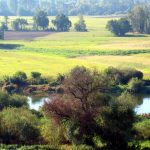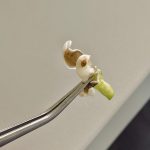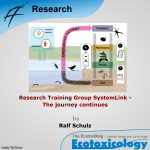As the year draws to a close, we want to take a moment to express our heartfelt gratitude to each of you. Your unwavering engagement have made EcotoxBlog a vibrant community!
Continue readingWarm Wishes for the Holidays!



As the year draws to a close, we want to take a moment to express our heartfelt gratitude to each of you. Your unwavering engagement have made EcotoxBlog a vibrant community!
Continue reading
The Helmholtz Centre for Environmental Research (UFZ) is accepting applications for the position of an environmental scientist for a project related to identification and prevention of pesticide inputs into water bodies.
Continue reading
In this blogpost, Veronica Rodriguez and Lorenz Witt share their internship experience at nEcoTox, Germany. Students of the Environmental Pollution Management (Ecotoxicology) Program complete an 8-week internship each year, the so-called “AMEO”. The AMEO is performed either at an external university, governmental or industrial research institute where students learn to apply the competences achieved during their study. Students also use this opportunity to travel and explore Germany.
Continue reading
The University of Duisburg-Essen is accepting applications for a PhD position in Computer Vision / Deep Learning in the Faculty of Biology, working group Phycology
Continue reading
In this blogpost, Larissa Herrmann talks about her latest research on pesticide reoccurrence in European surface waters, revealing that over 76% of compounds reoccur in aquatic ecosystems, with 40% previously unknown for long-term pollution. Her study, conservative in scope, highlights the need to reassess environmental risks, emphasizing the importance of understanding the long-term occurrence of pesticide impacts on water ecosystems.
Continue reading
In this blogpost, Karla Fernanda González shares her internship experience at Eurofins. Students of the Environmental Pollution Management (Ecotoxicology) Program complete an 8-week internship each year, the so-called “AMEO”. The AMEO is performed either at an external university, governmental or industrial research institute where students learn to apply the competences achieved during their study. Students also use this opportunity to travel and explore Germany.
Continue reading
In this blogpost, Ralf Schulz reports that the DFG has decided to continue the funding of the Research Training Group 2360 SystemLink, which is taking place at the iES Landau.
Continue reading
M. Sandhya, our current Editor and Social Media Manager, is beginning a new chapter in her life, thus the EcotoxBlog is looking for a new Editor and Social Media Manager, starting February 2024. Please note that only affiliates of the RPTU (Campus Landau) are eligible for this position.
Continue reading
In this blogpost, Beatrice Mah shares her internship experience at Federal Environment Agency (Umweltbundesamt), Germany. Students of the Environmental Pollution Management (Ecotoxicology) Program complete an 8-week internship each year, the so-called “AMEO”. The AMEO is performed either at an external university, governmental or industrial research institute where students learn to apply the competences achieved during their study. Students also use this opportunity to travel and explore Germany.
Continue reading
Justus Liebig University is accepting applications for a PhD position (with a specialization in ecotoxicology, applied ecology and taxonomy). The position is initially limited to 3 years.
Continue reading